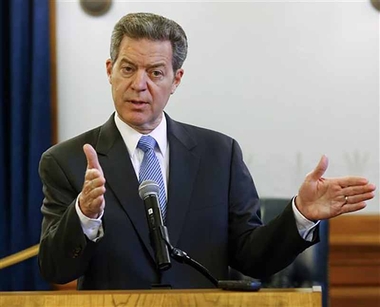Most new funds for Kansas schools would lessen local taxes

TOPEKA, Kan. (AP) — If Kansas legislators increase aid to poor school districts to satisfy a recent state Supreme Court order, much of the money would go to dropping local property taxes, not boosting classroom spending — and that bothers many Republicans.
The GOP-dominated Legislature convenes Thursday for a special session called by Republican Gov. Sam Brownback to address the court's order last month declaring that the state's education funding system remains unfair to poor school districts. The justices warned that schools might not be able to reopen after June 30 if further changes aren't made by then.
Brownback has embraced a proposal to increase education funding by $38 million for the 2016-17 school year to help poor districts. But as much as 75 percent of that money could go toward lowering property taxes, which those districts already use to fund their schools, according to the State Department of Education.
Many Republican legislators have championed tax cuts and backed proposals in recent years to rein in cities' and counties' property tax levies, while also questioning whether schools spend money efficiently enough. Now, in a drive to persuade constituents that the state Supreme Court has over-reached, they're complaining that not enough of the proposed new education funding would go toward the classroom.
"This isn't a fight about school funding. It's a fight about property tax relief," said Senate Vice President Jeff King, an Independence Republican.
An explanation of why most of the new funds would go to property tax relief:
___
WHAT'S IN PLAY
The problems identified by the court in its last order involve a single but major piece of the more than $4 billion a year in aid the state provides to its 286 districts. That aid helps poor districts keep up with wealthier ones if they supplement their state aid with a "local option budget" for general operations, financed with local property tax levies.
Kansas law caps local option budgets at an average of $2,340 per student so that wealthy districts don't outpace poorer ones too much in their per-pupil spending.
Districts have come to rely more heavily over the years on their "LOBs" to fund basic operations and raised 98 percent of the funds they were allowed in 2015-16.
The state also provides additional aid to districts based on the total value of their property per student, so that they don't have to impose as much in local taxes for their local option budgets.
The state has set aside $429 million for such "LOB aid," for 2016-17, and the plan embraced by Brownback would increase it to $467 million.
Even with such a boost, some wealthier districts still would lose aid amid a court-mandated recalculation of how it is distributed. The three largest districts in Johnson County, the state's most populous, would lose nearly $4.8 million.
___
CONSTITUTIONAL ISSUES
The Kansas Constitution says the Legislature must make "suitable provision" for financing the state's "educational interests." The state Supreme Court has ruled repeatedly that the language requires lawmakers to finance a suitable education for all children, whether they live in rich or poor areas.
The court also said in its last order that districts must have "reasonably equal access to substantially similar educational opportunity through similar tax effort."
"Equalization is about evening out the purchasing power of individual districts," said John Robb, an attorney for four school districts pursuing the lawsuit, which was filed in 2010.
Rep. Ed Trimmer, a Winfield Democrat who serves on the House Education Committee, said he's "not sure it's a bad thing" to provide tax relief to home and business owners in districts that are considered poor because of their per-pupil property values.
Meanwhile, said another Democrat, Rep. Jim Ward, of Wichita, "The people of Kansas want us to do our jobs, fix the problem and keep schools open."
___
REPUBLICAN FRUSTRATIONS
When a previous state Supreme Court ruling in 2014 in the same lawsuit prompted legislators to boost aid to poor school districts, Brownback, then seeking re-election, and GOP lawmakers bragged about the property tax relief they were providing.
But now many of them are frustrated that extra state aid they'd provide in a special session wouldn't translate into a dollar-for-dollar increase in classroom spending. They've publicly chided the court for threatening to keep schools closed over a little extra property tax relief.
"Some have said this is about the kids," said House Appropriations Committee Chairman Ron Ryckman Jr., an Olathe Republican. "I'm not sure that connects with the reality of the situation in front of us."
JOHN HANNA, AP Political Writer
Copyright 2016 The Associated Press. All rights reserved. This material may not be published, broadcast, rewritten or redistributed.
The Gayly - 06/18/2016 @ 1:15 p.m. CDT





